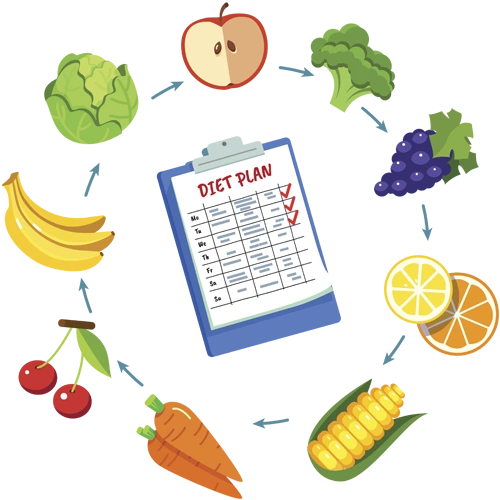Menopause is a significant phase in a woman’s life, often bringing various changes, including weight gain. Hormonal shifts, reduced muscle mass, and changes in metabolism all contribute to this challenge. However, with the right diet and lifestyle adjustments, such as following “The Menopause Diet 5 Day Plan to Lose Weight,” it is possible to manage your weight effectively. Ever wondered how a tailored approach can make a difference?
Our menopausal diet 5-day plan to lose weight provides a functional and unique solution to support weight management during menopause. However, every person varies in health and body type, so it is crucial to consult with a healthcare provider before starting a diet plan.
Let’s begin this journey to understand menopause and its diet plan.
![]()
Why does Weight gain occur during Menopause?
Weight gain during menopause is a big concern for many women. Hormonal changes, significantly the decrease in estrogen levels, can lead to changes in the body composition and fat distribution. Other factors like age, lifestyle, and genetics also play a role. Here’s a closer look at which causes and strategies to manage weight gain during menopause:
1. Hormonal Changes:
Estrogen is an essential hormone in a female’s life. During menopause, it drops, leading to disturbance in body’s distribution of fat, which causes accumulation of fat in different areas like the abdomen.
2. Slowed Metabolism:
Aging in women slows down their metabolism and leads to weight gain.
3. Loss of Muscle Mass:
Hormonal changes, along with less physical activity, can cause loss of muscle mass, eventually lowering the metabolic rate of the body.
4. Lifestyle factors:
Other lifestyle factors such as insufficient sleep, poor diet, dehydration, and stress can cause weight gain during menopause.
What are the Health Issues during Menopause?
Menopause is a natural biological process marking the end of a woman’s reproductive years. It typically occurs between the ages of 45 and 55. While menopause itself is a normal part of aging, it can bring about several health issues and symptoms due to hormonal changes, particularly the decline in estrogen levels. Some of the most common health issues and symptoms associated with menopause are hot flashes, night sweats, vaginal dryness and discomfort, irregular periods, sleep disturbances, mood swings, and weight gain. Long-term health issues are osteoporosis, cardiovascular diseases, urinary incontinence, cognitive changes, and joint pain.
It’s important to remember that each person’s experience with menopause and its symptoms is unique and can vary greatly. Consulting a healthcare provider during this transition can be very helpful.
What are the Benefits of Maintaining Weight during Menopause?
Menopause brings a whole new set of health concerns for some women, lack of physical activity, low metabolic rate, lack of sleep, lower level of estrogen, and dehydration are some of the most common causes. Maintaining weight during this transition can save you from a lot of pesky health risks. Below are some of the benefits of maintaining weight during menopause:
- Maintaining weight during menopause can reduce the risk of chronic diseases such as type 2 diabetes, high blood pressure, heart diseases, and which can become more prevalent in menopause.
- Weight management can help reduce stress on joints, which can lower the risk of osteoarthritis and alleviate pain.
- Managing weight can reduce the risk of osteoporosis, which is common in aging women.
- A healthy weight can reduce the risk of developing cancer, most commonly breast and endometrial cancers, which are linked to excess body fat.
- Losing some extra weight can help reduce menopause signs because being heavy can worsen symptoms of menopause.
Here is the menopause diet 5 day plan to lose weight
Creating a balanced 5 day meal plan for weight loss during menopause involves focusing on nutrient-dense foods that support metabolism, manage weight, and address menopause-related symptoms.

Here’s a sample plan:
Day 1
The menopause diet 5 day plan to lose weight focuses on a healthy and fresh diet that keeps you energetic throughout the day. Here’s the day 1 meal plan for you:
| Breakfast | Snack | Lunch | Snack | Dinner |
| Greek yogurt with fresh berries and a sprinkle of chia seeds. | A small apple with a handful of nuts. | Grilled chicken salad with mixed green vegetables, cucumber, tomatoes, and a dressing of your choice. | Carrot sticks with hummus. | Baked salmon with a side of quinoa and steamed broccoli |
Day 2
Following your fresh start on Day 1, Day 2 will focus on adding vegetables and fruits of your choice to help cleanse your gut. Here’s your revised meal plan for Day 2:
| Breakfast | Mid-day Snack | Lunch | Afternoon Snack | Dinner |
| Oatmeal topped with sliced banana, walnuts, and a drizzle of honey. | Any fruit. | Grilled chicken and green veggie salad. You can add avocado and nuts as well. | Cucumber slices with hummus. | Stir-fried tofu with mixed vegetables (bell peppers, snap peas, mushrooms) over brown rice |
Day 3
Now you are officially on day 3 of your diet; you can add some foods that can balance your hormones and purify your gut; here’s the day 3 meal plan for you:
| Breakfast | Mid-day Snack | Lunch | Afternoon Snack | Dinner |
| Smoothie with spinach, frozen berries, a banana, and a scoop of protein powder | A small handful of mixed nuts | Lentil soup with a side of mixed green salad | Sliced cucumber with a light vinaigrette | Grilled shrimp with a side of roasted sweet potatoes and green beans |
Day 4
A weight loss diet during menopause doesn’t have to be dull or make you feel deprived of delicious foods. This 4-day gourmet meal plan will satisfy your cravings while keeping you in a calorie deficit:
| Breakfast | Mid-day Snack | Lunch | Afternoon Snack | Dinner |
| Whole-grain toast topped with mashed avocado, a sprinkle of sea salt, cracked black pepper, and a drizzle of balsamic glaze. | A refreshing salad of mixed citrus segments (orange, grapefruit) with a sprinkle of fresh mint and a touch of honey. | A vibrant salad with chickpeas, roasted red peppers, cherry tomatoes, red onion, and feta cheese. | A few slices of bell pepper with guacamole. | Baked chicken breast with a side of steamed spinach and a small serving of wild rice. |
Day 5
Congratulations! You’ve reached the final day of your weight loss diet, successfully managing your calorie intake for 4 days and benefiting your body in the process.
| Breakfast | Mid-day Snack | Lunch | Afternoon Snack | Dinner |
| Cottage cheese with pineapple chunks and a sprinkle of flax seeds. | A small handful of grapes | Quinoa and black bean salad with corn, cherry tomatoes, and cilantro. | Celery sticks with almond butter. | Turkey meatballs with spaghetti squash and marinara sauce. |
What are the Factors that Supports Weight Loss During Menopause?
Several factors support weight loss during menopause, especially when combined with a menopause diet 5-day plan to lose weight. A balanced diet rich in nutrient-dense whole foods, lean proteins, healthy fats, and fiber is essential. Limiting refined sugars and processed foods, along with practicing portion control, helps prevent weight gain. Regular exercise, paired with a structured diet plan, is vital, as strength training and cardiovascular activities boost metabolism, build muscle mass, and burn calories. Adequate sleep, which is often disrupted during menopause, is crucial for weight management. Managing stress through practices like yoga and mindfulness can also prevent emotional eating. Staying hydrated supports metabolism and helps control hunger, while addressing hormonal imbalances stabilizes metabolism, and reduces the risk of weight gain. Consistency in following the menopause diet 5 day plan to lose weight, along with regular exercise, is key to successfully managing weight during this phase.
Benefits of Exercise During Menopause
Key Takeaways
Embarking on a 5-day diet plan during menopause can be a powerful step towards managing symptoms and enhancing overall well-being. This short-term plan emphasizes balanced nutrition, hormone-supportive foods, and mindful eating, which can make a significant difference in how you feel. By incorporating more whole foods, lean proteins, healthy fats, and plenty of fruits and vegetables, you can help stabilize your energy levels, improve your mood, and support your body through this natural transition.
Menopause Diet Plan Book
If you’re looking for a book specifically focused on diet plans for menopause, here are some popular options:
The Menopause Diet Plan: A Natural Guide to Managing Hormones, Health, and Happiness by Hillary Wright and Elizabeth Ward
The Hormone Reset Diet: Heal Your Metabolism to Lose Up to 15 Pounds in 21 Days by Sara Gottfried, M.D.
The Menopause Diet by Dr. Larrian Gillespie
The Estrogen Fix: The Breakthrough Guide to Being Healthy, Energized, and Hormonally Balanced by Mache Seibel, M.D.
Frequently Asked Questions
How to lose weight fast during menopause?
To lose weight fast during menopause, focus on a balanced diet with increased protein, reduced carbs, and plenty of fiber and healthy fats. Incorporate regular exercise, including strength training and cardio, to boost metabolism and burn calories. Stay hydrated, manage stress, and ensure you get 7-8 hours of sleep each night. Consider intermittent fasting and consult a healthcare provider for personalized advice.
What is the best food to eat for menopause?
The best foods for menopause include calcium and vitamin D-rich options like dairy and leafy greens for bone health. Phytoestrogen-rich foods such as soy and flaxseeds can help balance hormones, while healthy fats from fish and nuts support heart health. High-fiber foods like whole grains, fruits, and vegetables aid in digestion and weight management.
What is the #1 best food for menopause symptoms?
The #1 best food for menopause symptoms is soy. Soy contains phytoestrogens, which are plant-based compounds that can mimic estrogen in the body, helping to balance hormones and reduce symptoms like hot flashes and night sweats.
How to lose 5 kilos in menopause?
To lose 5 kilos during menopause, focus on a balanced diet with reduced calories, emphasizing lean proteins, vegetables, and healthy fats while avoiding sugars and processed foods. Incorporate regular exercise, including both cardio and strength training, to boost metabolism and burn fat. Additionally, practice portion control, stay hydrated, and ensure you get 7-8 hours of sleep each night.
What burns menopause fat?
To burn menopause fat, focus on regular cardio exercises like walking, running, or cycling to burn calories and fat. Strength training is also essential, as it builds muscle mass, which boosts metabolism and helps burn fat more efficiently. Additionally, a diet rich in lean proteins, healthy fats, and fiber, combined with portion control, supports fat loss during menopause.
Does fasting help menopause weight?
Yes, intermittent fasting can help with menopause weight by reducing overall calorie intake and improving insulin sensitivity, which may help manage weight gain during this stage. Fasting can also promote fat burning and reduce the risk of metabolic issues that are more common during menopause. However, it’s important to approach fasting carefully, ensuring you maintain balanced nutrition and consult with a healthcare provider to determine if it’s suitable for your specific needs.
What is the Best Diet for women in Menopause?
Women in menopause are susceptible to hormonal fluctuations, bone density loss, and metabolic changes. To combat these challenges, their diet should include foods rich in calcium and vitamin D, fiber, healthy fats, protein, nuts, herbal teas, and phytoestrogens. Additionally, they may consider taking vitamin D, omega-3, and calcium supplements, but only after consulting with a healthcare provider.
This article is for informational purposes only and does not substitute professional medical advice. Consult a qualified healthcare provider for personalized guidance.


